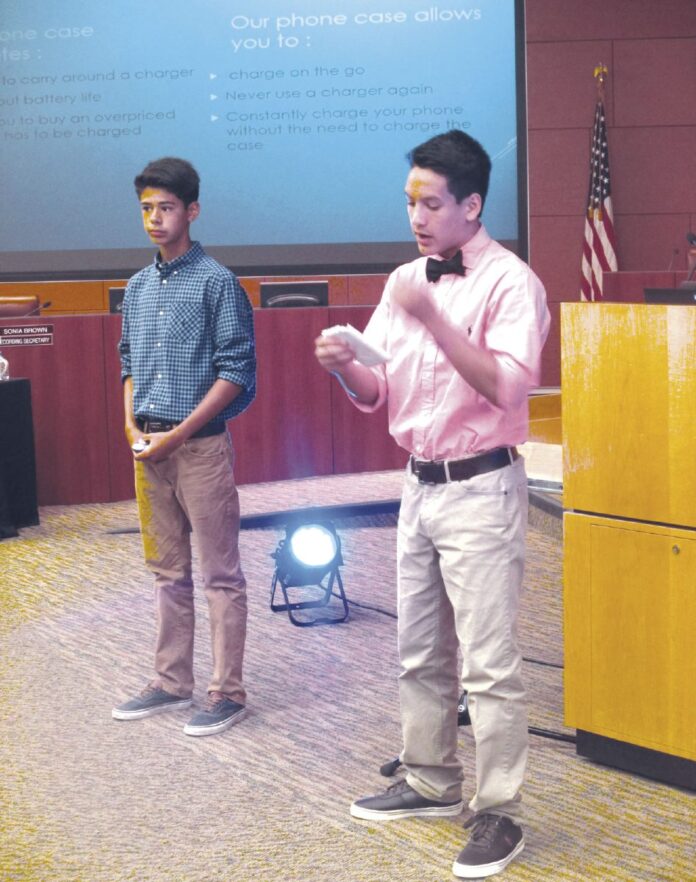HARLINGEN — Make me an offer I can’t refuse.
The judges at the “Shark Tank Final Presentation” made several offers yesterday to invest in “The Heat,” a new way to keep cell phones charged. The invention so impressed the seven judges, or “sharks,” it came in second place at the event at the Harlingen Consolidated Independent School District.
Students from the Dr. Abraham P. Cano Freshman Academy presented a total of nine inventions at the event. The “water collar” by Manuel Conde, Sophia Pearcy and Catherine Duncan took first place. The “Motbot,” presented by Maya Wilson, Megan Aune and Amelia Barrera, came in third.
The event is similar to the ABC reality television series of the same name in which aspiring entrepreneurs make business presentations to a panel of investors known as “sharks.” These investors hear the presentations and decide whether the proposals are viable investments.
In yesterday’s contest, the students pitched their ideas to local business leaders who then questioned them about their project. They then decided whether to invest in sort of a mock demonstration of the actual process. Some inventions held real possibilities such as the “Motbot.”
“It’s a device you put on your finger as a sensor on you finger tip,” said Megan, 15, describing the Motbots.
The user, she explained, could then run it across print and then hear the words. All three members of the “Motbot” team seemed to have enjoyed the experience.
“We’re pretty happy,” said Maya, 15. “We got $5 million and 18 percent.”
“And that’s what we asked for,” added Amalia.
Ben Rozeff, 15, and fellow inventor Michael Becerra received several offers for “The Heat” after they’d given a presentation which obviously impressed the sharks. They entered the large room and quickly shook hands with each shark, demonstrating the importance of professional courtesies as well as the nuts and bolts of inventions.
Ben began the presentation by pointing out the problem of cell phones needing to be charged frequently.
“Our new product, The Heat, is going to alleviate all that,” said Ben. He and fellow inventor Michael then told the judges about their invention of a small thermoelectric power generator. The piece was attached to a phone case and used body heat to recharge cell phones.
Similar technology is already in use in South Korea, said Michael, but not in phone cases. That would be their new development. But, they needed capital to proceed, so they were asking the seven judges for $300,000 in exchange for 15 percent of the company.
“I urge you guys to buy this and I thank you,” said Michael, 15.
Jonathan Medina, a motivational speaker who served as one of the sharks, offered $700,000 in exchange for 60 percent of the company.
Ben and Michael scoffed at the idea.
“We would like to keep ownership of the company,” said Ben, as everyone laughed.
Medina had in fact made the offer to test their mettle. Such an invention, he said, has real possibilities.
“I didn’t think my offer would be accepted. I thought it was a great idea,” Medina said. “I think it will come out sometime.”
Ultimately, David Flinn made the final offer of $500,000 for 20 percent of the company to make the new system for charging cell phones.
“It’s a very practical solution,” said Flinn, vice president of Ferris, Flinn and Medina LLC.
Richard Caldwell, branch manager for Pacific Union Financial, also served as a judge. He, like the other judges, was impressed by all the presentations, which also included “Chill Jams” which used ice chests to install sound equipment.
“I thought they were very good, very well prepared,” said Caldwell.
Young minds, unfettered by years of specific learning, had been set free to explore the endless possibilities of innovation. In the worlds of these young pioneers, art and science had come together through the power of the imagination.




